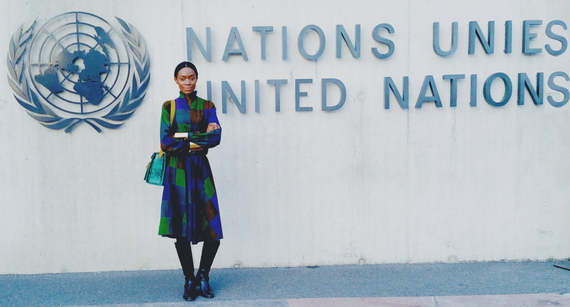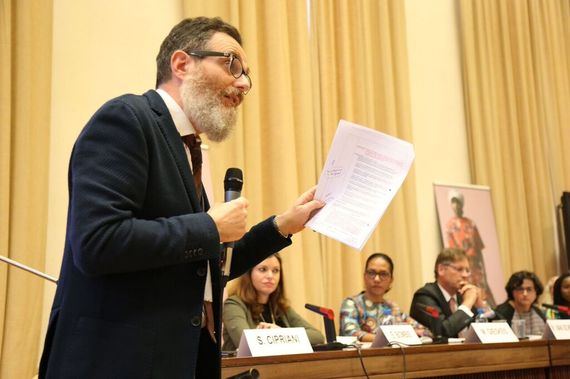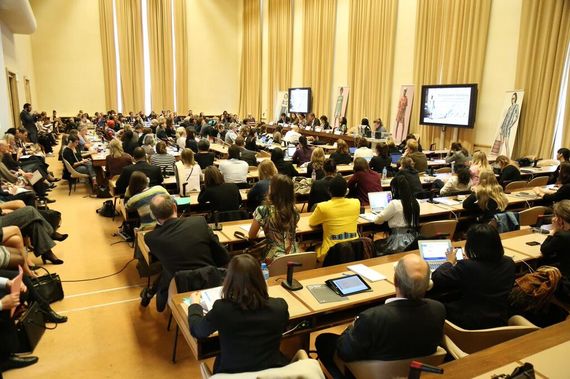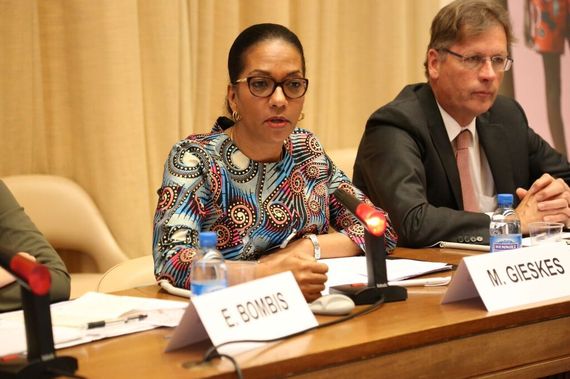Four days after the Paris attacks, my emotions were still running high. Nonetheless, on November 17, I attended "Empowering Women in Africa's Fashion Industry": a panel discussion about Sustainable Fashion at the 4th Annual United Nations Forum on Business and Human Rights in Geneva, Switzerland.
The panel discussion was preceded by a brief fashion presentation featuring the work of designers Dent de Man (Ivory Coast/UK), Sindiso Khumalo (South Africa) and Yapumfout Pasma from Cameroon in collaboration with Vlisco Group.
Before an auditorium of 200 guests, Simone Cipriani, Head & Founder of Ethical Fashion Initiative, moderated a panel of 7 international experts. Can the value chain of fashion be a vehicle of socio-economic development and empowerment for women in Africa ?
EMPOWERING THROUGH EDUCATION & PARTNERSHIPS
"Vlisco is not only in Africa to trade, but also to add value to the lives of our stakeholders," insisted Monique Gieskes, Vlisco Group Director of Brand Protection & Corporate Social Investment in the Democratic Republic of the Congo.
Based in Helmond, Netherlands and founded in 1846, Vlisco provides colourful fabrics which have grown into an essential part of African culture -- receiving widespread attention from the art, design, and fashion worlds. (as seen below)
The Dutch company has developed 3 educational programs on the African continent including, The Vlisco Tailor Academy. With presence in DRC, Ghana and Nigeria, the fashion facilitation program welcomes "under-privileged, talented and motivated young girls and women trained to become financially autonomous and contribute to the development of their communities," Gieskes explained.
"Once they have completed their Master classes and reached their financial autonomy, they enter into a partnership with us, so they can also support Vlisco in developing our presence locally."
Gieskes added, "We also link them to local fashion houses, so they can be recruited as stylists and tailors, as well as support them in starting their own businesses after graduation."
Headed by Moderator Simone Cipriani, Ethical Fashion Initiative is notorious for its inclusive business model which fosters creative collaborations between African, Caribbean artisans and world renowned brands such as: Stella McCartney, Vivienne Westwood and Stella Jean.
This successful joint-venture promotes and exports local craftsmanship on a global scale which connects over 12,000 micro-producers-- 98% of them are women across Mali, Burkina Faso, ect.
Independent data collected by inspectors show that 83% of the micro-producers involved with Ethical Fashion Initiative manage to send their children to school. In terms of performance enhancement, 75.7% of micro-artisans received training on the job, 94% have been able to acquire new skills and 78% use skills learned to build their own businesses.
NOT CHARITY, NOT VANITY, JUST WORK
"Our initiative is not about charity, it's about jobs," stressed Arancha Gonzalez, Executive Director of International Trade Centre.
While her eponymous sustainable designs have been showcased in prestigious venues such as the Royal Festival Hall in London and the Smithsonian Museum of African Art in Washington, South African Designer, Sindiso Khumalo, clarified that, "It is not just about making pretty dresses.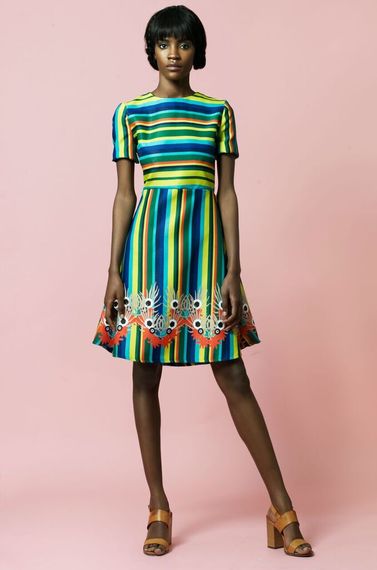
Fashion is about making a change in people's lives, providing decent jobs, sending kids to school and protecting the environment," elaborated the Central St Martins graduate.
"Over 80% of our traders are women who contribute the most in their households and to the socio-economic development of their communities," expressed Monique Gieskes, Vlisco Group Representative.
Panellist Omoyemi Akerele, Founder of Lagos Fashion & Design Week asserted that, "Africa's asset is its' people. Fashion can tap into the strengths and resources available on the continent."
For three consecutive years, the Nigerian-lawyer-turned-fashion consultant has been featured on The Business of Fashion's Global 500 List.
Sindiso Khumalo SS16 ©Andrew Ho
EMPOWERING THROUGH ENVIRONMENTAL AWARENESS, CORPORATE SOCIAL RESPONSIBILITY & HUMAN RIGHTS
According to the Danish Fashion Institute (2013), fashion is the world's 2nd most polluting industry (second only to oil): 25% of chemicals produced worldwide are used for textiles. The fashion industry is often noted as the number two polluter of clean water after agriculture.
With the objective "to achieve, for the first time in over 20 years of UN negotiations, a binding and universal agreement on climate, from all the nations of the world," COP21 Paris Climate Change Summit is currently taking place in France until December 11.
Although Africa contributes the least of any continent in the world to global warming,
with an exceptionally quick industrial expansion, Ethiopia has already been dubbed the "China of Africa".
There, labor costs are lower than any Southeast Asian garment-making hub. A golden opportunity for fast-fashion retailers such as H&M, which automatically raises concerns of corporate social responsibility and environmental sustainability.
Through the predominant use of manual techniques, natural, organic and recycled materials from dumpsites as well as discarded materials from the fashion industry, Ethical Fashion Initiative endeavors to limit damage to the environment.
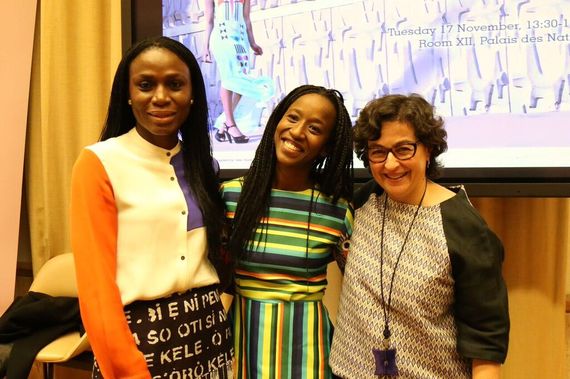 Omoyemi Akerele (left), Sindiso Khumalo (center), Arancha Gonzalez (right) ©International Trade Centre
Omoyemi Akerele (left), Sindiso Khumalo (center), Arancha Gonzalez (right) ©International Trade Centre
Introduced by the panel moderator as "the most prominent advocate of fair labor worldwide," Auret van Heerden advises consumers to question the production process when making a purchase.
Indeed, where a vast majority of businesses make the conscious decision not to manufacture ethically for the sake of profit, "In the end the bill is paid by the workers who have no voice or power. There is a real danger in re-creating a Rana Plaza situation in Africa," - reiterated van Heerden.
For Arancha Gonzalez, Executive Director of International Trade Centre, fashion is a business that can address human rights:
"We can eradicate poverty through fashion. You can do good while doing business. Ethical Fashion is about products that speak to consumers.
It is not charity; It is shared values: we create fair and decent jobs; we ensure women economic empowerment, we preserve artisanal traditions, we contribute to sustainable development, we build local entrepreneurship; we leverage development aid with business solutions to generate growth through trade."

